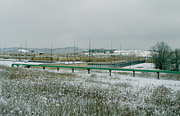
Reliable steam supply is just one of many serious problems a correctional institution must address when demanding fail-safe system design. However, that issue was one of particular concern to Fayette Thermal, the company under contract with the Pennsylvania Department of Corrections to supply steam to the new 672,000-sq-ft State Correctional Institution.
Pittsburgh has an existing correctional institution that has too little capacity and is old. The state selected a site in nearby Fayette County for a new institution. The new prison would sit on top of a 400-ft precipice that borders the Monongahela River — the nearest town being on the other side of the river and the nearest bridge, nine miles away. In order to protect the site from the weather and prevent it from becoming an eyesore, approximately 100 ft of the top of the mountain was dug out, creating a bowl-like shape.
Because of its location and budgetary constraints, the original design had called for three large firetube oil-burning boilers. Pennsylvania, like many other states, mandates that a new state facility must use indigenous fuel, but space constraints made installing the firetube boilers impractical.
Even Chicken Litter And Turkey Feathers...
Due to operational cost concerns and increasing oil prices, the use of oil was revisited and a closer look was taken at using coal or waste coal indigenous to the area. There are a lot of waste coal piles in the southern and southwestern parts of the state near the facility.Power Consultants was called in to solve the problem. David Goldsmith, Power Consultants’ design engineer, helped design and implement a waste coal fuel system for the steam plant. “We specialize in building steam facilities using energy from waste fuels, coal being just one of these fuels. Others are chicken litter, tires, plastics, turkey feathers, wood waste, construction demolition waste, and many more.”
Power Consultants proposed that Fayette Thermal would build, own, operate, and service a freestanding boiler plant (not the central utility plant on the facility grounds) using bituminous coal tailings in high-efficiency fluidized bed boilers. The company would supply the facility’s steam needs under a long-term contract.
The fluidized bed boiler plant would be three quarters of a mile from the facility, on its own property. It would contain two fluidized bed boilers fired by the waste coal readily available in the area. Each would provide 15,000 lb/hr (500 hp) of steam. As for the central utility plant that was too small for firetube boilers, it had plenty of room for another part of the solution. Power Consultants, Inc. solved two problems with one proposal.
Instantaneous Back-Up
To provide a fail-safe system, Power Consultants, Inc. had to plan for every eventuality, according to Goldsmith. “When there is a problem with service from coal boilers, because a mechanical system fails, an instantaneous backup is paramount. Firetube boilers cannot respond like that.”The high efficiency, fluidized bed coal boilers are the heart of the facility’s steam plant. Power Consultants chose Miura boilers to give a highly reliable instantaneous backup to the coal-fired system. The boilers could easily fit into the central utility plant. “The relatively miniaturized waste coal watertube boilers are over three times bigger than the Miuras. And that is just the boiler without the baghouse and the other backend paraphernalia that goes alongside it,” he said, comparing the Muira boilers to the coal-fired units.
The Miura boilers would be located in the institution’s central utility plant. In fact, the new boilers are not only acting as backup boilers right now until the coal boilers are up and running, but they are carrying the entire steam load for the empty facility.
Fayette Thermal owns the three Miura boilers inside the central utility plant. Those are on a lease-back basis so that eventually, the state will own them. Fayette Thermal operates them all under a 20-year steam sales agreement.
“Maintaining the steam demand at the correctional facility is quite volatile, and that is another reason why we need the Miura’s instant response. For example, as you can well imagine, the inmates have to shower once a day. Just imagine two thousand people showering in a three-hour period. If the two coal-fired boilers at the top of the hill are chugging along but can’t respond fast enough to the steam requirements, then of course, one of these little Miuras kicks on and almost instantaneously supports the additional requirements,” said Goldsmith.
